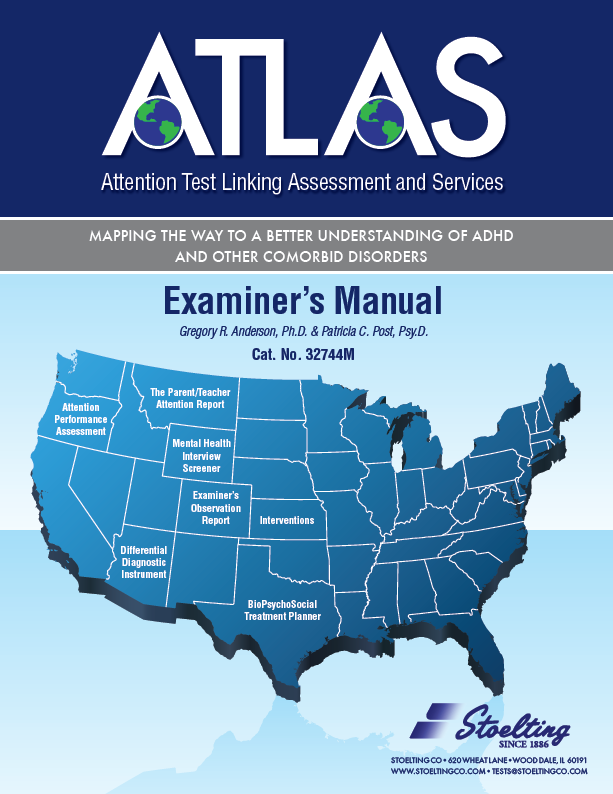Please specify the quantity of product(s).





Attention Test Linking Assessment and Services (ATLAS)
| Item | Product | Price | QTY |
|---|---|---|---|
| 32744 | Attention Test Linking Assessment and Services, Kit (ATLAS) | $290.00 | |
| 32744M | ATLAS Manual | $81.00 | |
| 32744A | ATLAS Parent/Teacher Attention Report Forms, Pk/50 | $83.00 | |
| 32744H | ATLAS Mental Health Interview Screener, Pk/25 | $50.00 | |
| 32744E | ATLAS Examiner's Observation Report Forms, Pk/25 | $43.00 | |
| 32744P | ATLAS Attention Performance Summary Report Forms, Pk/25 | $43.00 | |
| 32744S | ATLAS Subject Response Booklets, Pk/25 | $50.00 | |
| 32744C | ATLAS Client Profile Summary Report Forms, Pk/25 | $43.00 |
Utilizes a novel seven part approach for the identification of ADHD and other comorbid disorders and provides biopsychosocial treatment options.
Patricia C. Post, Psy.D. and Gregory R. Anderson, Ph.D.
- Age Range: 8-18 years
- Time: Approximately 45-50 minutes
- Restricted Use: Level B- requires that the user has completed graduate-level courses in tests and measurement at a university or has received equivalent documented training.
- (ATLAS is recognized by insurance panels as a valid, valuable assessment and treatment tool for ADHD.)
The ATLAS is the first comprehensive assessment system of its kind for diagnosing and treating ADHD, while differentiating between other possible comorbid disorders. It covers a wide variety of assessment and treatment domains with regard to ADHD, such as parent/teacher feedback, direct observation, mental health interview, and brain-based assessment. Until now, there has yet to be a measure that includes in-depth psychosocial strategies, cognitive behavioral strategies, educational intervention strategies, and biophysical referrals. This biopsychosocial approach is provided, not only for ADHD, but for various other mental health disorders, such as Oppositional Defiant Disorder, Depression, Anxiety, and Pervasive Developmental Disorders. It is appropriate for use by a variety of professionals, including teachers, educational diagnosticians, school psychologists, and clinical psychologists.
The ATLAS is comprised of seven distinct parts:
- Parent/Teacher Attention Report provides information on attention behaviors collected from two settings; the home and school.
- Provides General Classroom Interventions in order to address deficits noted in the Parent/Teacher Attention Report such as inattention/concentration, organization, hyperactivity, and impulsivity that may be remediated with a general intervention approach which can be utilized in the special or general education setting.
- Offers Attention Performance Assessment, utilizing several brief attention processing tests. This part also includes the Examiner’s Observation Report, to quickly and efficiently record and score test session behaviors and other observations during testing.
- A more in-depth approach or Second Level Interventions based on the data obtained from Parts 1 and 3. This more advanced level of intervention is geared towards more specific deficits such as difficulty in working memory and divided attention.
- Contains a brief Mental Health Interview Screener in order to begin to consider other potential comorbid disorders.
- The Differential Diagnostic Instrument helps the clinician to differentiate between ADHD and other mental health disorders by providing detailed diagnostic clues and questions. This part also helps the clinician to formulate appropriate referral questions.
- The Biopsychosocial Treatment Planner completes the instrument by offering suggestions and recommendations for client support and possible future referrals.
Perhaps the most useful parts of the assessment system are the general and higher order intervention strategies for addressing such issues as organization, inattention, hyperactivity, divided attention, and impulsivity. These two sections offer numerous interventions that can be used in either a general education classroom or in special education settings. Clinicians can provide concrete suggestions to those servicing students in the school. The Mental Health Interview Screener and Differential Diagnostic Measure help to determine whether or not the child’s behaviors are primarily related to ADHD or impacted by the presence of comorbid disorders. The biopsychosocial treatment planner utilizes all the data for comprehensive educational planning and treatment.
The ATLAS demonstrates good reliability, well above .90, for the Parent/Teacher Attention Report and Examiner’s Observation Report. The Mental Health Interview Screener shows acceptable reliability for an instrument used to direct the assessment toward the possibility of a comorbid disorder. Scores on the Attention Performance Summary Report show very good differentiation between typical students, those with ADHD, and those with learning disabilities.
The ATLAS Kit includes a Manual, and 25 each of the Parent/Teacher Attention Report Forms, Mental Health Interview Screener, Examiner’s Observation Report Forms, Attention Performance Summary Report Forms, Youth Response Booklets and Client Profile Summary Report Forms.
ATLAS Authors Test Description
